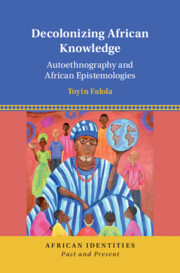Book contents
- Decolonizing African Knowledge
- African Identities: Past and Present
- Decolonizing African Knowledge
- Copyright page
- Dedication
- Contents
- Figures
- Notes on Language and Orthography
- Preface
- Acknowledgments
- Part I Introduction
- Part II History, Fictions, and Factions
- Part III Visual Cultures
- 9 Sculpture as Archive
- 10 Textiles as Texts
- 11 Canvas and the Archiving of Ethnic Reality
- 12 Yorùbá Hair Art and the Agency of Women
- 13 Photography and Ethnography
- Part IV Conclusion
- Bibliography
- Index
9 - Sculpture as Archive
from Part III - Visual Cultures
Published online by Cambridge University Press: 23 June 2022
- Decolonizing African Knowledge
- African Identities: Past and Present
- Decolonizing African Knowledge
- Copyright page
- Dedication
- Contents
- Figures
- Notes on Language and Orthography
- Preface
- Acknowledgments
- Part I Introduction
- Part II History, Fictions, and Factions
- Part III Visual Cultures
- 9 Sculpture as Archive
- 10 Textiles as Texts
- 11 Canvas and the Archiving of Ethnic Reality
- 12 Yorùbá Hair Art and the Agency of Women
- 13 Photography and Ethnography
- Part IV Conclusion
- Bibliography
- Index
Summary
This chapter beams the light on the artistry achievements of Africans and signifies their “flourishing culture.” The major aspect of artistry being celebrated is sculptures. From this chapter, one is able to deduce that the carvings are such that “Yoruba history and culture can be perceived, interpreted and understood” through them. They manifest in many forms (materially), such as bronze, clay, stone, and wood, all of whom were discussed to fully understand and appreciate the creativity inherent in the African culture before and after colonialism. With several references to specific sculptural works and pictorial evidence, mostly from his personal collection, the author describes how Yoruba sculptors (Gbenagbena or Gbegilere) translate and manipulate natural elements and past-but-relevant happenings into artistic objects. Also discussed is the measure of a sculptor’s worth, which cannot be defined by Western currency but by the level of creativity and beauty apparent in his artwork, some of which depict African cultural ideas, principles, and attributes, such as Omoluabi, Iwapele, Didan, and Idogba. The chapter extensively discusses the importance sculptors place on the head, and also defends African sculptures against Western criticism.
Keywords
Information
- Type
- Chapter
- Information
- Decolonizing African KnowledgeAutoethnography and African Epistemologies, pp. 205 - 281Publisher: Cambridge University PressPrint publication year: 2022
